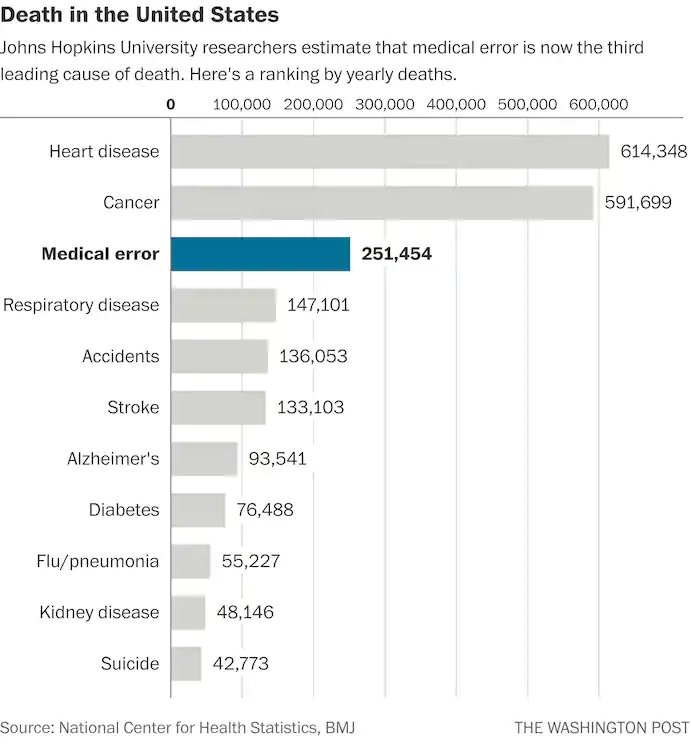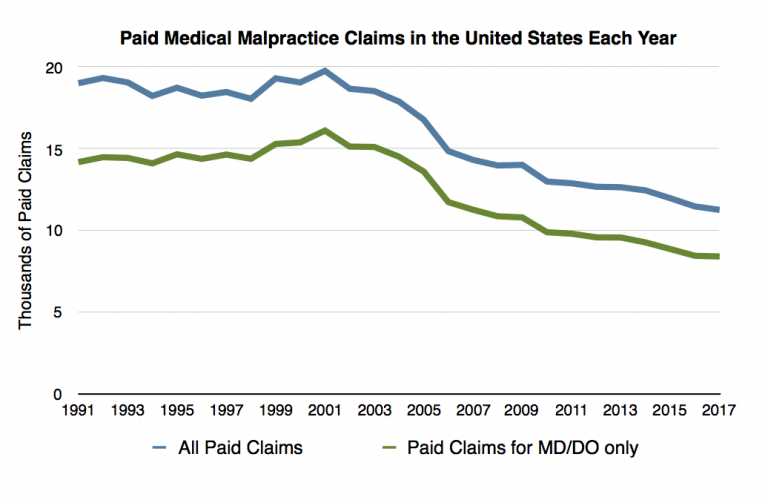Did you know that medical malpractice is the third-leading cause of death in the United States?
As a result, thousands of patients file medical malpractice cases against their physicians every single year with the hopes of reaching a fair settlement after suffering from unprecedented harm.

However, it’s hard to win a medical malpractice claim—and if you believe that you or somebody you love is a victim of malpractice, then it’s easy to think that your claim may not amount to anything.
The good news is that this isn’t always the case.
Before you decide to file your claim, it’s a good idea to become familiar with whether or not your case qualifies, the difference between malpractice and negligence, and the benefits of hiring medical malpractice lawyers who can help you when you need it. Let’s take a look.
What Is Medical Malpractice?
Medical malpractice is a term that describes an incident when your healthcare professional causes damage to you, as the patient, through negligence or omission. The damages can range from injury or illness that are either new or aggravated from an existing issue.
For example, your doctor or provider may be at fault for medical malpractice if he or she neglects to consider certain risks for a procedure or decides to forgo tests or examinations that might be necessary for diagnosis.
Because of its similarities, many patients get medical malpractice and medical negligence confused with one another. However, the two couldn’t be more different: In short, malpractice has intent, and neglect is a mistake.
What Is the Difference Between Medical Malpractice and Medical Negligence?
Although they sound similar, medical malpractice and medical negligence cases are not the same. They are approached and analyzed in different ways, which is why it’s essential to know the difference between the two:
- Medical Malpractice: Medical malpractice is a breach of the standard of care by a medical provider or medical facility.
- Medical Negligence: Medical negligence is when there is no discovered intent and is considered an honest mistake.
Does this mean that malpractice is always done with intent to harm? No, it doesn’t. However, medical malpractice does have the element of intent. For example, if the doctor or provider knew they should have done something to treat the patient but didn’t because he feared it would fail, then there is no intent to harm here—but fault would be on the doctor risking the patient’s health.
Why Do Medical Malpractice Cases Happen?
Although medical malpractice is rarely ever done with actual intent to harm, these cases happen all the time in the United States because of:
- Failure to diagnose or misdiagnosis
- Misreading or ignoring laboratory results
- Unnecessary surgery
- Surgical errors or wrong-site surgery
Misdiagnosis and delayed diagnoses are the number-one reason patients sue for malpractice. Misdiagnosed illnesses could lead to unnecessary treatments, which could potentially further harm the patient. In a medical malpractice lawsuit, the prosecutor would have to prove that the doctor didn’t follow the standard of care. Delayed diagnoses could further put off treatments and aids, resulting in worsening conditions or even death.
In addition to misdiagnoses, some other common causes of medical malpractice cases are due to:
Childbirth
Childbirth has its own set of risks alone, but many childbirth medical malpractice claims are relevant to the fetus’s health and potential pregnancy complications.
For example, suppose a doctor fails to diagnose the fetus’s potentially dangerous or life-threatening health condition to the mother. In that case, the mother may choose to file a malpractice lawsuit because she could have decided to take alternative steps had she been given the correct information.
Anesthesia
Although rare, some people have reactions to anesthesia, and others have fatal complications. Complications may occur if:
- The doctor fails to review the patient’s history
- The hospital is using defective equipment
- The anesthesiologist uses too much anesthesia on the patient
While the patient will sign consent forms before the procedure, the doctor can help prevent a medical malpractice claim by doing the proper research and administration.
Informed Consent
Informed consent gives all available information to the patient so they can make their own decisions on medications, procedures, and tests. Informed consent malpractice occurs when the healthcare provider doesn’t disclose all possible risks of a procedure to the patient.
Although patients typically have to sign a consent form acknowledging all potential risks, sometimes this isn’t enough. The healthcare professional should make sure the patient is completely aware of every risk to avoid a medical malpractice claim.
Infections
Superbugs like Staphylococcus aureus are extremely common in hospital settings. Additionally, infections like bloodstream infections, pneumonia, and urinary tract infections are also prevalent—and yet, only 17% of hospital physicians warn their patients of the risk of infection during their hospital stay. In these instances, the patient may file a medical malpractice claim against their physician.
Medication Errors
Medication errors cause 7 to 9 thousand deaths each year in the United States, but each one could result from several reasons. For example, the doctor may not have:
- Appropriately reviewed the patient’s history or allergies
- Administered the drug improperly
- Made a mistake with the dosage amount
- Prescribed the incorrect medication
- Prescribed medication to the wrong patient
Doctors need to be diligent about their expected standard of care because the wrong prescription or dosage can be fatal, which could lead to one of several medical malpractice cases.
Surgical Errors
No matter the procedure, surgeries always have the potential to be dangerous. That’s because it’s not incredibly uncommon for surgical errors to occur, like puncturing organs, operating on the wrong site, or even leaving instruments and foreign objects in the body. Although these incidents are likely accidents, the patient may want to open a medical malpractice case against their surgeon.
What Is a Medical Malpractice Lawsuit?
As mentioned before, medical malpractice is when a healthcare professional causes harm or injury to their patient from either intent, omission, or neglect. This means that the physician failed to adhere to their profession’s standard of care.
In turn, the patient may file a medical malpractice lawsuit, which is the legal cause of action where the patient (or the patient’s family) will file a claim with intent to sue the physician or healthcare professional for causing harm.
Understanding Medical Malpractice in New York
Depending on which state you live in, filing a medical malpractice lawsuit comes with a few rules.
In New York, medical malpractice has a filing deadline, which is also known as the statute of limitations.” The statute of limitations is a specific time limit on your right to file a claim from the date the malpractice initially occurred.
As a patient, you have two and a half years from the date of the alleged malpractice to go to court and get your medical malpractice lawsuit filed. In the case of a patient’s continuous treatment with a physician or hospital, the statute does not begin to run until the last date of treatment. In the case where a foreign object was left in your body after surgery, then you would only have one year from the date of discovery or the date of discovering facts to file a claim. In recent years, New York passed an additional law which extends the time which you have to file a lawsuit in misdiagnosed cancer cases to two and a half years from the date of discovery of the misdiagnosis, as opposed to the actual date of the misdiagnosis.
What are the Possible Outcomes of a Medical Malpractice Lawsuit?
Your medical malpractice lawsuit has two possible outcomes: The judge either finds that there is not enough proof for malpractice, or your lawyer defends your case successfully. The latter leaves you with either an economic or non-economic outcome:
- Economic: A person may receive a monetary settlement for medical malpractice claims if there were significant financial damages. The healthcare provider would have to cover costs like extensive medical stays, rehab costs, and any work loss.
- Non-Economic: A person may receive a non-economic outcome for medical malpractice claims if the injury does not have significant life-long financial repercussions. Instead, the patient should exhibit emotional or physical trauma, have suffered a loved one’s death, or experienced disfigurement.
Are Medical Malpractice Cases Difficult to Prove?
Medical malpractice cases can be very challenging to prove. In fact, in New York alone, there are only 17.3 paid claims per 1,000 physicians.

These cases can be challenging because it’s difficult to prove that an injury or illness was caused by the surgeon, doctor, or healthcare provider’s negligence. That’s why working with experienced medical malpractice lawyers is essential.
Why Do You Need a Lawyer for Medical Malpractice?
Although it’s often the last thing on most victims’ minds, working with a medical malpractice attorney is the best way to get the justice you may deserve. Here’s why:
Reason #1: Your Lawyer Will Utilize Resources For Your Case
Hiring medical malpractice attorneys means that the whole team works for you. They will work tirelessly to prove your case by consulting with medical experts, analyzing your medical records, and even conducting medical research. They will also utilize their network of other resources that are relevant to your case.
Your lawyer will also refer to what’s called the four elements of a medical malpractice lawsuit,” which are:
- Duty of Care: The duty of care refers to the existing legal, professional responsibility that is owed from the doctor to the patient.
- Breach of Duty: The doctor who has this duty of care must have failed to fully exercise that another healthcare professional would have been able to in the same situation.
- Damage: Damage refers to any injury caused by the breach of duty of care, which could include emotional or physical impairments, whether it’s a new one or an aggravation of an existing injury.
- Cause: There must be proof that the healthcare provider had a breach of duty that caused the patient’s damages. This point is the hardest for a medical malpractice attorney to prove, but not impossible.
As long as these elements are met and satisfied, your chance of winning your lawsuit is exponentially greater.
Reason #2: Your Lawyer Is Familiar with the Process
While excellent medical malpractice attorneys should have experience in this field, they don’t need to have won or even represented cases like yours to know what to do.
A good lawyer has been through this process before. They know precisely how the claim process works, how to file the proper paperwork when to negotiate your settlement, and how to present the evidence in your favor.
Plus, keep in mind that lawyers debate for a living, so an experienced attorney will be able to deflect and reconstruct the defendant’s story or accusations to help your case. While these skills are essential to any court process, they are especially medical malpractice cases since they are notoriously challenging to win.
Reason #3: You Can Rest and Recover While Your Lawyer Works
After undergoing a trauma, your lawyer may refer to pain and suffering, which is the legal term used to describe physical and emotional stress caused by the incident. In this case, pain and suffering is any emotional trauma, injury, or illness caused by medical malpractice.
Your lawyer will calculate your pain and suffering to help your case—but what’s more important is that you find time to heal during this complicated process. So no matter the emotional or physical stress you may be enduring, you can recover with ease knowing that your lawyer is working hard to exhaust all resources to represent your case so that you get a fair settlement.
Conclusion
Medical malpractice is one of the most common causes of death in the United States. Whether it’s due to neglect or omission, these cases happen far too often—but unfortunately, most lawsuits are either lost or dismissed. No matter the type of case, it’s challenging to prove that your injury or illness was caused by a specific procedure, medication, or surgery.

That’s because New York City hospital lawyers are prepared to combat lawsuits like these. However, there is a bright side: Last year, there were more than $685 million in medical malpractice payouts to New York patients alone.
That’s why it’s critical to work with an experienced medical malpractice attorney. Your expert lawyer will strengthen your chances of winning your case and getting the settlement you deserve.
Schwartzapfel® Lawyers Can Help You Today
If you’re searching for a medical malpractice lawyer, then it might be time to call New York City’s Schwartzapfel® Lawyers.
With over 35 years of experience in all-things personal injury, including medical malpractice, the Schwartzapfel® team is prepared to fight for you. By utilizing all resources, conducting their own research, and interviewing relevant professionals, Schwartzapfel® Lawyers is dedicated to getting you the compensation you deserve.
Contact Schwartzapfel® Lawyers today for a free consultation.


















